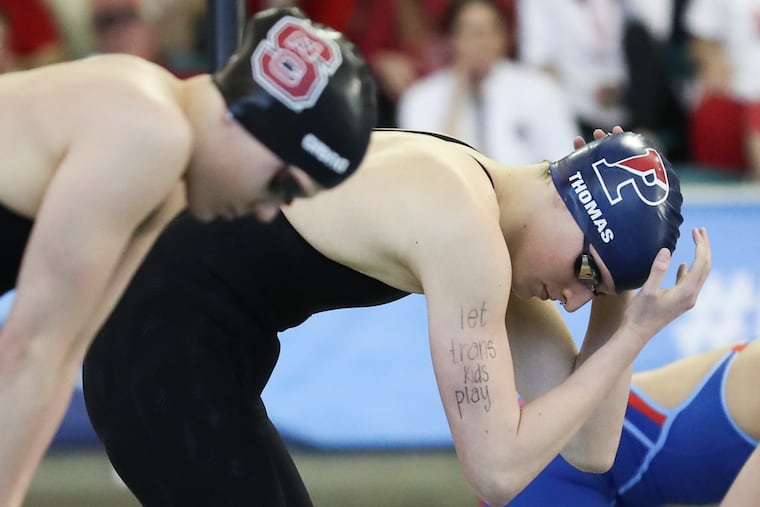Penn swimmer Lia Thomas finishes eighth in final day of NCAA championships
Lia Thomas placed into the finals of the 100, but finished in 8th.

ATLANTA ― Penn swimmer Lia Thomas wrapped up her collegiate career with an eighth-place finish in the final night of the NCAA Division I Swimming and Diving National Championships on Saturday.
Thomas, a fifth-year senior and transgender woman, swam the 100-yard freestyle final in 48.18 seconds. University of Virginia freshman Gretchen Walsh touched the wall first in 46.05 seconds, establishing a new pool record at Georgia Tech’s McAuley Aquatic Center.
In the preliminary races, Thomas beat her own Penn program record with a time of 47.37 seconds in order to rise from the 10th seed entering the meet to fourth seed in the final.
Thomas’ eighth-place final result makes her a three-time All-American. She has earned the honor in every event she competed in this weekend, after taking first in the 500-yard freestyle on Thursday and finishing fifth in the 200-yard freestyle on Friday.
Finishing ahead of Thomas in the 100-yard freestyle in a tie for fifth was Yale junior Iszac Henig, a trans man. Henig has not undergone any hormonal replacement therapy, and remains eligible to compete on the women’s team.
» READ MORE: Lia Thomas just wants to swim. But at the NCAA championships, she won’t be able to stay out of the spotlight.
On Saturday, Thomas and Henig became the first known trans athletes to compete in the same NCAA Division I championship event. Both swam with “Let trans kids play” written on their arms in marker — a nod to the bills being passed in some legislatures outlawing trans athletes to play on teams that match their gender identities.
“It was very important to me and I was glad that Lia was with me in doing so,” Henig said of the message on their arms.
“There’s so many bills right now in so many different states that hurt trans people, trans women especially. And I think to be able to speak out against that and use this platform that I have is really powerful for me,” he said in an interview after the race.
Henig and Thomas raced each other in the 100-yard freestyle twice this season prior to the NCAA Championships. Henig took first place in a January meet between Penn and Yale, while Thomas topped the podium at the Ivy championships in February.
“She is an incredible athlete, right? So a lot of respect for that,” Henig said of Thomas. “And she’s also a friend, and it’s so fun to race your friends, it’s fun to have someone to push you to go faster like this. This entire meet is filled with incredible athletes that I feel honored just to be able to race.”
Both Thomas and Henig’s successes this season have brought national attention to the debate over trans athletes’ right to compete in sports. Thomas, in her first year swimming with the Penn women’s team, is at the center of the controversy. Her critics claim that her male-at-birth assignment gives her an unfair biological advantage over cisgender women, while her supporters say that trans women should not be excluded, and because Thomas has followed all NCAA regulations, she has a right to compete.
The NCAA Championships themselves have exhibited the dispute, with small groups of protestors gathered outside the McAuley Aquatic Center or in the stands on each day of competition.
Henig said there are far greater issues impacting women’s sports, like equal pay, that protesters should focus on.
“That’s far more important to me than, you know, someone’s birth gender,” he said.
On Saturday, while a few members of Save Women’s Sports congregated outside the recreation center, a small group of counter-protestors assembled, holding signs that read “Discrimination not welcome,” and “We support trans/queer athletes.”
Thomas was not the only Penn swimmer competing on Saturday. Juniors Catherine Buroker and Anna Kalandadze raced in the 1650-yard freestyle final, finishing 19th and 42nd, respectively.
Buroker, who was seeded 44th ahead of the championships, shaved almost 14 seconds off of her qualifying time in the final. This is Buroker’s third trip to the NCAA Championships, and she is just the second Quaker in program history to earn multiple bids to the women’s NCAA Championships.
This rounds off a historic weekend for the Quakers, as it marks the first time three Penn women’s swimmers qualified for the same NCAA Championships, and the first time a Penn women’s swimmer has claimed an NCAA title.